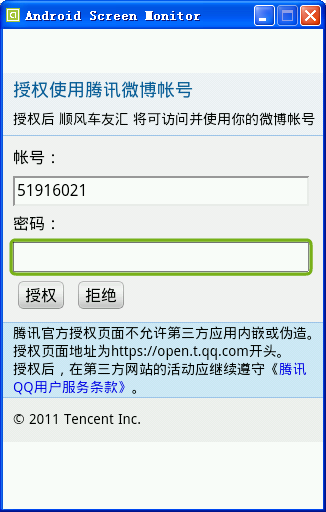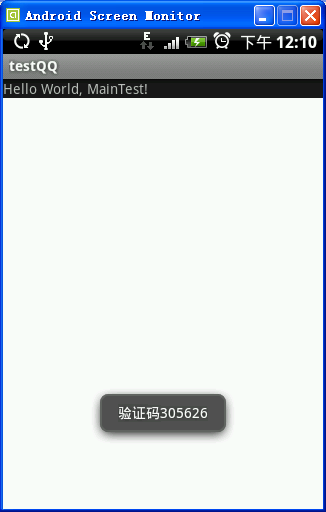本文主要是介绍2011年沈大海讲师Android的腾讯微博客户端源代码,实现oauth_verifier自动提取!,希望对大家解决编程问题提供一定的参考价值,需要的开发者们随着小编来一起学习吧!
如果大家开发过Android版的新浪微博客户端可以通过如下接口直接在客户端返回oauth_verifier
以下是我加的方法,注意增加了userId和passwd参数,大小写userId的I是大写,该问题困扰了我1晚上。
l public String getAuthorizationVerifier(String uid,String pass) {
l return httpClient.getAuthorizationURL() + "?oauth_token=" + getToken()+"&userId="+uid+"&passwd="+pass+"&oauth_callback=json";
l
l }
但是在腾讯中没有该方法,只能弹出页面,之后就跳转到了另一个url,而oauth_verifier在url中,不能通过代码直接获取,其实在Android中式可以解决的,如下图:


因为,Android中不同的URl可以由我们自定义的Activity组件来处理,而不一定是Webkit,实现方法如下:
编写入口Acitivity实现如下代码:
package com.qqtest;
import com.qq.weibo.OAuth;
import com.sdhjob.util.ConfigUtil;
import android.app.Activity;
import android.content.Intent;
import android.net.Uri;
import android.os.Bundle;
import android.util.Log;
import android.webkit.DownloadListener;
import android.webkit.WebView;
import android.webkit.WebViewClient;
import android.widget.Toast;
import android.content.Intent;
import android.net.Uri;
import android.os.Bundle;
import android.util.Log;
import android.webkit.DownloadListener;
import android.webkit.WebView;
import android.webkit.WebViewClient;
import android.widget.Toast;
public class MainTest extends Activity {
/** Called when the activity is first created. */
@Override
public void onCreate(Bundle savedInstanceState) {
super.onCreate(savedInstanceState);
setContentView(R.layout.main);
String key = ConfigUtil.getValue("qq.weibo.appKey");
String secret = ConfigUtil.getValue("qq.weibo.appSecret");
OAuth oAuth = new OAuth(key,secret);
WebView w=(WebView)this.findViewById(R.id.ok);
// 运行完后注释掉这段 放开 32行到37行的代码
String oauthToken = oAuth.getOauthToken();
Log.d("qq","oauthToken="+oauthToken);
if( this.getIntent()!=null&&this.getIntent().getData()!=null)
{
Uri uri = this.getIntent().getData();
//验证码
String oauth_verifier = uri.getQueryParameter("oauth_verifier");
Toast.makeText(this,"验证码"+oauth_verifier, 1000).show();
}else
if(oauthToken != null){
final String url=" https://open.t.qq.com/cgi-bin/authorize?"+oauthToken;
Intent it=new Intent(Intent.ACTION_VIEW,Uri.parse(url));
this.startActivity(it);
}
}
}
/** Called when the activity is first created. */
@Override
public void onCreate(Bundle savedInstanceState) {
super.onCreate(savedInstanceState);
setContentView(R.layout.main);
String key = ConfigUtil.getValue("qq.weibo.appKey");
String secret = ConfigUtil.getValue("qq.weibo.appSecret");
OAuth oAuth = new OAuth(key,secret);
WebView w=(WebView)this.findViewById(R.id.ok);
// 运行完后注释掉这段 放开 32行到37行的代码
String oauthToken = oAuth.getOauthToken();
Log.d("qq","oauthToken="+oauthToken);
if( this.getIntent()!=null&&this.getIntent().getData()!=null)
{
Uri uri = this.getIntent().getData();
//验证码
String oauth_verifier = uri.getQueryParameter("oauth_verifier");
Toast.makeText(this,"验证码"+oauth_verifier, 1000).show();
}else
if(oauthToken != null){
final String url=" https://open.t.qq.com/cgi-bin/authorize?"+oauthToken;
Intent it=new Intent(Intent.ACTION_VIEW,Uri.parse(url));
this.startActivity(it);
}
}
}
红色部分是怎么实现的呢,看androidmanifest .xml:
<?xml version="1.0" encoding="utf-8"?>
<manifest xmlns:android=" http://schemas.android.com/apk/res/android"
package="com.qqtest"
android:versionCode="1"
android:versionName="1.0">
<application android:icon="@drawable/icon" android:label="@string/app_name">
<activity android:name=".MainTest"
android:label="@string/app_name">
<intent-filter>
<action android:name="android.intent.action.MAIN" />
<category android:name="android.intent.category.LAUNCHER" />
</intent-filter>
<intent-filter>
<action android:name="android.intent.action.VIEW" />
<category android:name="android.intent.category.DEFAULT" />
<category android:name="android.intent.category.BROWSABLE" />
<data android:scheme="qqweibook" />
<data android:host="qqweibo.sdhjob" />
</intent-filter>
</activity>
<manifest xmlns:android=" http://schemas.android.com/apk/res/android"
package="com.qqtest"
android:versionCode="1"
android:versionName="1.0">
<application android:icon="@drawable/icon" android:label="@string/app_name">
<activity android:name=".MainTest"
android:label="@string/app_name">
<intent-filter>
<action android:name="android.intent.action.MAIN" />
<category android:name="android.intent.category.LAUNCHER" />
</intent-filter>
<intent-filter>
<action android:name="android.intent.action.VIEW" />
<category android:name="android.intent.category.DEFAULT" />
<category android:name="android.intent.category.BROWSABLE" />
<data android:scheme="qqweibook" />
<data android:host="qqweibo.sdhjob" />
</intent-filter>
</activity>
</application>
<uses-permission android:name="android.permission.INTERNET"></uses-permission>
</manifest>
///
<data android:host是在请求腾讯的api时候加入的参数
oauth_callback = "qqweibook://qqweibo.sdhjob"; // —— 用户授权后的返回地址
///
至于怎么使用腾讯API不说了,你懂的............................................................................
源代码下载地址:
http://download.csdn.net/source/3205035
http://download.csdn.net/source/3205035
这篇关于2011年沈大海讲师Android的腾讯微博客户端源代码,实现oauth_verifier自动提取!的文章就介绍到这儿,希望我们推荐的文章对编程师们有所帮助!






